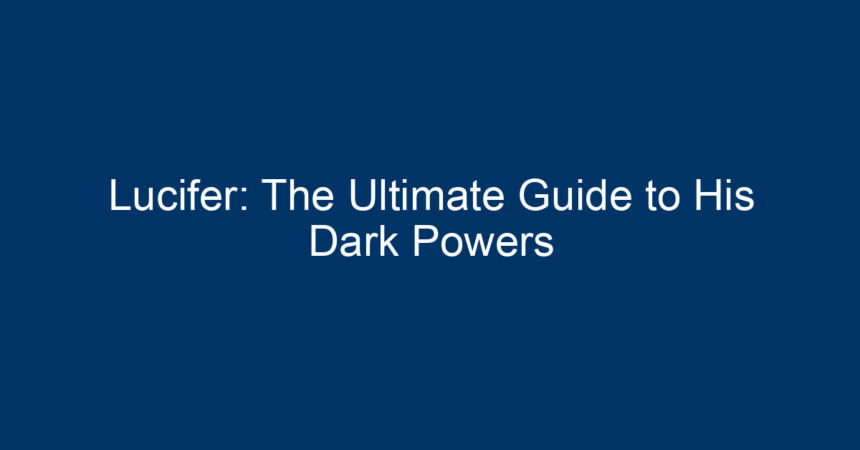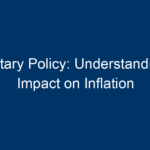Introduction
Lucifer, the enigmatic figure often associated with rebellion and darkness, has captivated audiences in literature, religion, and popular culture for centuries. With a captivating blend of charm, intelligence, and inherent darkness, he stands as a multifaceted character embodying both sin and redemption. In this ultimate guide, we’ll explore Lucifer’s dark powers, his evolution across different narratives, and his impact on our understanding of good, evil, and free will.
The Origin of Lucifer
Theological Roots
Lucifer’s origins can be traced back to ancient theological texts, primarily within Christian doctrine. Often equated with Satan, he was originally perceived as a beautiful angel cast out of heaven for his pride and desire to ascend to the stature of God. Scripture describes his fall in Isaiah 14:12-15, where he is referred to as the "morning star" or "light-bringer." This biblical narrative lays the groundwork for understanding his dark powers.
Literary Evolution
Over the years, Lucifer’s depiction has evolved through literature. In John Milton’s "Paradise Lost," he is portrayed as a tragic hero, eloquently justifying his rebellion. This literary exploration deepens our understanding of his motivations and the allure of power, making him more relatable to audiences.
The Dark Powers of Lucifer
Manipulation and Deception
One of Lucifer’s most potent powers is manipulation. He excels in shaping perceptions, often leading individuals to question their morals and beliefs. This ability to deceive is not merely about lying; it extends to influencing thoughts and emotions, creating a web of confusion and despair. In modern adaptations, we often see him engaging in psychological battles with his adversaries, highlighting his mastery over this power.
Seduction and Temptation
Lucifer’s powers also manifest in his seductive nature. His charm is irresistible, allowing him to draw people into his fold effortlessly. This theme is prevalent in various adaptations, including TV shows like "Lucifer," where he uses his allure to tempt characters into making morally ambiguous choices. This representation invites viewers to explore their notions of right and wrong.
Immense Knowledge
Another remarkable power Lucifer possesses is his immense knowledge. Often depicted as an entity who understands human nature, he uses this insight to his advantage. Knowing people’s desires and weaknesses allows him to manipulate situations and alter outcomes. This knowledge ranges from emotional insights to magical abilities, making him a formidable opponent in any narrative.
Resilience and Immortality
As a celestial being, Lucifer is often depicted with attributes of immortality and resilience. No matter how many times he is defeated, he rises again, embodying the theme of eternal rebellion. This resilience serves as both a power and a curse, perpetuating his conflict with other celestial beings and humans alike.
Control over Hell
In many portrayals, Lucifer is the ruler of Hell, showcasing his command over dark forces. This power embodies his ability to punish souls and influence the afterlife, acting as both judge and executioner. Representations in media often delve into his management of Hell, displaying a complex system of governance amidst chaos.
Lucifer in Popular Culture
Television: "Lucifer"
The hit TV series "Lucifer" offers a fresh take on the character, presenting him as a charismatic anti-hero who runs a nightclub in Los Angeles. Here, his powers are reimagined within a contemporary context, blending elements of crime-solving with themes of redemption. The show invites viewers to see Lucifer as a complex character grappling with his nature.
Literature: "The Devil’s Advocate"
In literature, books like "The Devil’s Advocate" explore Lucifer’s dark powers within legal and moral frameworks, questioning societal norms and ethical dilemmas. These narratives draw readers into the depths of his motivations, showcasing how his powers can be both destructive and enlightening.
Film: "Constantine"
Lucifer also appears in films like "Constantine," depicted as a manipulative antagonist. His powers are portrayed as sinister, emphasizing the darker aspects of his character. This portrayal serves to reinforce traditional notions of good and evil, blending horror with philosophical questions about morality.
The Duality of Lucifer
Benevolent or Malevolent?
Lucifer’s duality as both a villain and a tragic figure prompts debates surrounding his true nature. While he embodies darkness and rebellion, his intelligence and charisma lead many to view him as a misunderstood character. This complexity invites audiences to engage in discussions about morality, free will, and the consequences of one’s choices.
Lessons to Learn: Embracing Free Will
Lucifer’s narrative emphasizes the importance of free will. By depicting his choices—both good and bad—narratives encourage audiences to reflect on their own decisions. They challenge us to consider how we wield our powers, whether for good or ill.
Actionable Insights
Understanding the Complexity of Morality
Lucifer serves as a reminder that morality is rarely black and white. By examining his character, individuals can learn to navigate their own moral landscapes, recognizing that every choice has a consequence.
Embracing Personal Power
Each of us possesses a form of personal power, whether in the knowledge we hold or the influence we exert. Like Lucifer, we can harness these attributes for positive change in our lives and the lives of others.
Cultivating Empathy
Lucifer’s journey highlights the importance of empathy. By understanding the motivations behind one’s actions—both light and dark—we cultivate compassion towards ourselves and others. This empathy can lead to more harmonious relationships and a deeper understanding of the human experience.
Conclusion
Lucifer, as a character, embodies the complexities of human nature, exploring themes of power, temptation, and morality. His dark powers serve not just as a means of manipulation but as a canvas for profound philosophical exploration. By understanding Lucifer’s character through various lenses—literature, television, and theology—we gain insights into our own struggles with morality and free will.
As you navigate your own path, reflect on the lessons from Lucifer’s journey. Recognize the powers within yourself, question the nature of good and evil, and embrace the freedom to choose your destiny. Through this exploration, we not only unravel the mystery of Lucifer but also the intricacies of our own existence. So, delve into the depths of Lucifer’s dark powers and emerge with a greater understanding of life’s eternal dance between light and darkness.




